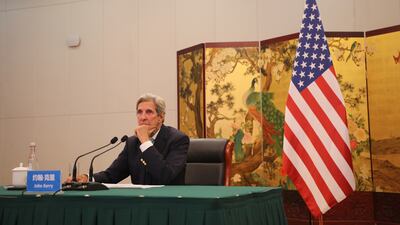Representatives from the world's two largest economies met this week to discuss efforts to combat climate change, with US climate envoy John Kerry visiting China for meetings through Friday.
Mr Kerry met his Chinese counterpart Xie Zhehua and other Chinese officials in Tianjin as part of their collaborative effort to address the climate crisis.
"My response to them was, look, climate is not ideological, not partisan and not a geostrategic weapon," Mr Kerry told reporters.
"It is essential ... no matter what differences we have, that we have to address the climate crisis," he said.
The two countries have largely agreed in recent months that climate is something they can work on together despite tension in areas such as trade, Covid and human rights — but that may have changed this week.
"It is impossible for China-US climate co-operation to be elevated above the overall environment of China-US relations," said China's State Councillor and Foreign Minister Wang Yi.
Some statements on Thursday suggested disagreements over how much responsibility each country has when it comes to climate change.
Mr Wang said the US had made a "major strategic miscalculation towards China".
He added that "the ball is now in the United States' court and the US should stop seeing China as a threat and opponent".
Meanwhile, Mr Kerry stated that there is “no way” for the world to solve the climate crisis without China’s “full engagement and commitment".
China and the US have publicly stated their goals of keeping the global average temperature below 2°C, reaching carbon neutrality in their respective countries and helping developing nations expand their renewable energy sectors.
“The United States and China are committed to co-operating with each other and with other countries to tackle the climate crisis, which must be addressed with the seriousness and urgency that it demands,” said a joint statement from Mr Kerry and China's Special Envoy for Climate Change Xie Zhenhua in April.
Countries made ambitious global pledges during a climate change conference led by US President Joe Biden this spring.
China is responsible for about 28 per cent of global emissions and it continues build coal-fired power plants.
Mr Kerry said on Thursday that the construction of China's new coal plants could "undo the capacity of the world to reach net-zero by 2050".
Chinese President Xi Jinping announced at the summit that his country will aim to reach carbon neutrality by 2060 after reaching peak carbon dioxide emissions before 2030.
Meanwhile, the US is the second-largest emitter, with 11 per cent of global emissions.
Mr Biden also announced at the summit that the US will cut its 2005 carbon emissions levels 50-52 per cent by 2030.
On Tuesday, Mr Kerry stopped in Tokyo, Japan, for a meeting on climate goals before the Cop26 conference in Glasgow, UK, scheduled for mid-October.
News agencies contributed to this report.







